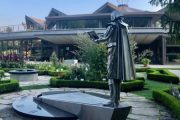Except for Colonel Allfool, whose person and subject I despised, and did little to conceal, our school was fine. It was an all-boys’ ‘prep’school which required the purchase of school uniforms, an expense on top of exorbitant school fees, hitherto paid by Shell, but not so here, not at home. The boys I instantly liked: they were friendly, articulate, and acted much younger than the insufferable tough-guy attitude some Americans boys of the era appeared to have adopted from the cinema, an attitude stemming, no doubt, from a fear of being regarded as effeminate, and we shared interests in cars, reading, lists, model aircraft, general knowledge, and British history. Both Desmond and I soon had firm friends. Apart from Allfool, my teachers, all male, were good. I became very fond of my English and history teachers, in particular. The headmaster taught geography, and had been in the Royal Navy during the war, but irritated me with a certain ‘know-it-all’ attitude to life, yet he had not travelled much, and pronounced the name of Argentina’s capital city as ‘Boonus Airs’. For a geography teacher, such ignorance, I thought, was contemptible. I enjoyed the hymn singing, prayers, and Bible readings of every morning’s assembly, and realized how much more I needed to know of my own cultural background.
Despite my mother’s frugality and housekeeping skills, the cost of living soon became an issue. Everything was more expensive, and Shell no longer subsidized living expenses or paid for holidays, as it had in Venezuela. Foreign postings were then considered ‘hardship’ destinations requiring extra compensation. We had travelled first class by sea to England twice as a family. We had been to Barbados several times, and to New York, and also, memorably, to Mexico, for a long stay, to Cuernavaca, Taxco, and Teotihuacan, where we climbed the Pyramid of the Sun. My mother had even been granted passage back to London in 1956 to give birth to my youngest brother on English soil because she distrusted Venezuelan hospitals. All this was on the company’s dime. No wonder his colleagues told my father, “You’ve had your time in the sun.” Such envy, as well as his feeling that his work was insufficiently appreciated by his superiors, led Dad to think of changing jobs. It was a time of tension for the family, and led to the decision to emigrate. The obvious candidates were the English-speaking Commonwealth countries of Australia, which then offered ‘assisted passage’ to U.K. citizens as “ten-pound Poms,” and Canada, an oil-producing country whose friendly pilots my father had liked when he first met them in a Prisoner of War camp in 1944. It seemed that a parting of the ways with his employer was the inevitable step for my father to take, especially as Shell had given Dad credit for pensionable service for the war years that he had served his country in the RAF, giving him a total of 25 years’ service credit by 1963. It was now 1962.




